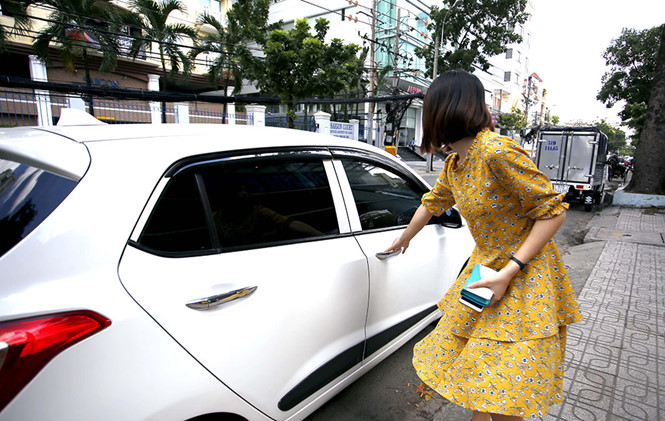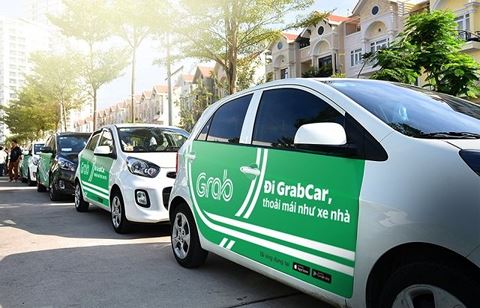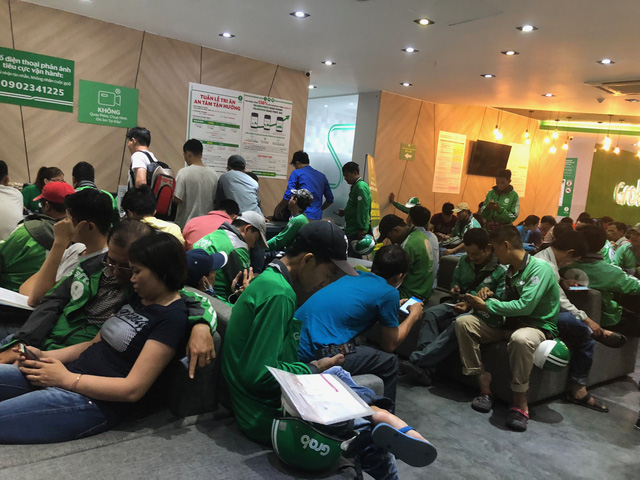Almost two months after Grab became the dominant player in the ride-hailing industry with Uber’s exit from Vietnam, commuters and drivers have continuously complained about its exorbitant fares and poor quality.
Grab officially took control of Uber in Vietnam and across seven other ASEAN countries on April 10, claiming that it would not take advantage of the situation to charge high rates.
But in reality, its price is still surging.
Hoang Khanh, a resident in Ho Chi Minh City’s District 4, complained that Grab charges are now higher than before, even for the same distance, during the same time frame.
“A three-kilometer trip from Hoang Dieu Street in District 4 to Nguyen Dinh Chieu Street in District 3 in a four-seater GrabCar previously cost me only VND25,000-29,000 [US$1.1-1.3], now it sets me back almost VND39,000 [$1.7],” Khanh said.
Dancing prices
In the same situation, a local in District 7 identifying herself as Hanh was shocked to see the fare of VND320,000 ($14) when booking a trip about 14 kilometers, from her place to Tan Phu District’s Tan Huong Street, during a high-demand period.
“But four minutes later, I tried booking again and saw that the price decreased to VND270,000 [$12]. I also double-checked with Vinasun’s hailing app and it was VND10,000 [$0.44] cheaper Grab at that time,” Hanh complained.
 |
| A GrabCar picks up a passenger in Hanoi. Photo: Tuoi Tre |
According to many passengers, Grab rates have unreasonably increased by at least 25-30 percent, regardless of time or traffic conditions, since the Uber takeover.
Grab commuters also complained that the tech-based motorbike taxi service currently does not offer appealing promotions to cash-users, forcing them to purchase via its in-app mobile wallet Grabpay that is linked with users' credit/debit card.
Jerry Lim, director of GrabTaxi Vietnam, admitted to Tuoi Tre (Youth) newspaper that Grab has increased its rates since 2017 due to constant gasoline price hikes.
“Gasoline prices rose six times in 2017. We raise rates to be fair to our partners as drivers complain that gasoline prices are rising but our rates have not changed," Lim said.
It is becoming more difficult for customers to book rides as drivers tend to cancel trips as they wish or even accept the booking but never show up, causing more trouble for Grab users.
Driver and customer management
Quite a lot of GrabBike drivers took to the Grab office in District 10, Ho Chi Minh City on Monday morning to protest having their accounts locked for "unknown reasons" by the company.
Do T. Ng., a GrabBike driver in Binh Tan District, said that Grab suspended his driving account since Saturday after he canceled an unexpected booking from a customer.
“When I arrived at that displayed address, the customer asked me to carry two more children, who were over 12 years old,” Ng explained.
Ng. turned down the request and asked the customer to call off the booking since riding three people violates Vietnamese law.
However, the customer refused to cancel the trip and the two sides had a quarrel, after which the ride booker reported it to Grab, which led to the driver’s account suspension.
 |
| GrabCar taxis stop by the sidewalk in Ho Chi Minh City. Photo: Tuoi Tre |
Similarly, some drivers also moaned that Grab always listens to one-sided reports from passengers, suspending the accounts of their drivers without any verification.
“That causes Grab drivers like me to become idle several days before the company solves the issues,” Ng. complained.
The drivers suggest that the ride-hailing operator should inform their partners via text messages or phone calls of any reported issue before making any further decision.
New competitors
In a situation where both Grab drivers and customers are hurt, Go-Jek from Indonesia is getting ready to ride in Vietnam.
The Indonesian tech giant is already recruiting professionals in Vietnam to serve the country’s 93 million citizens, Dealstreetasia reported.
Founded in 2010, Go-Jek quickly became a ‘unicorn’ startup after securing funding from Alphabet Inc.’s Google and China’s Tencent Holdings.
From its beginning as a ride-hailing app, Go-Jek has evolved into a one-stop shop for 18 different services including entertainment ticket selling service Go-Tix, medicine delivery service Go-Med, massage service Go-Massage, beauty service Go-Glam, and professional cleaning service Go-Clean.
Meanwhile, Grab has moderately stopped at eight services including GrabTaxi, GrabCar, GrabBike, on demand carpool ride sharing service GrabShare, fixed fare on-demand service JustGrab, on-demand parcel and courier service GrabExpress, food delivery platform GrabFood and GrabPay.
A local app, VATO, which claims to have received $100 million from Vietnamese bus line Phuong Trang, has jumped in to fill the void left by Uber though it is not yet popular with riders.
At the same time, technology motorbike firm Aber will also arrive in Hanoi next week.
The Aber app has been developed since 2015 by a group of Vietnamese engineers in Europe.
The founders have piloted some programs in a number of Southeast Asian countries this year.
 |
| A Go-Jek driver rides a customer through a street in Jakarta, Indonesia. Photo: Go-Jek |
Like us on Facebook or follow us on Twitter to get the latest news about Vietnam!




















































